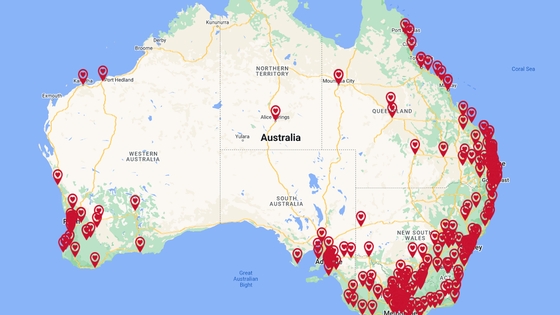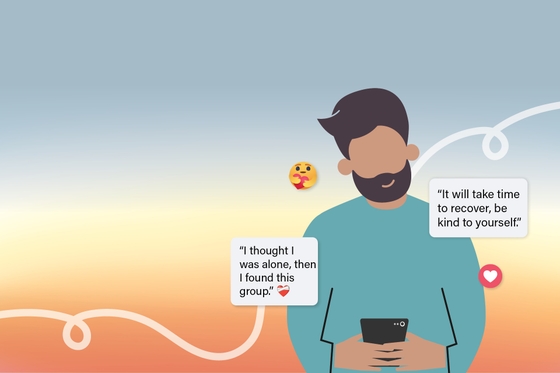
MyHeart MyLife: For health professionals
A support program for your patients living with coronary heart disease
MyHeart MyLife is designed to meet the information and support needs of adults living with coronary heart disease and those who care for them.
The program complements your clinical care by helping patients to better manage their condition to reduce their risk of future heart events and to live well with heart disease.
Your patients, and their carers, can also join the MyHeart MyLife Facebook community, where they can connect with others living with a heart condition for peer support.
MyHeart MyLife was a great support tool that answered a lot of questions and reduced the fear and anxiety of not knowing the best path forward. It was comforting to know that I was not alone in this journey.
MyHeart MyLife participant
How does it work?

Recommend the program to your patients. Refer your patients to myheartmylife.org.au to join the program.

Patients register at myheartmylife.org.au with their contact details and respond to a few brief questions so we can tailor their support.

Patients receive evidence-based information and practical tips via online content, emails and text messages. Patients can also access the MyHeart MyLife Facebook community.
Why refer your patients?
|
|
Complements clinical care MyHeart MyLife provides easy-to-digest information to help your patients understand and actively participate in their care – from taking their medicines to forming heart-healthy habits. |
|
|
Provides tailored and evidence-based information Whether your patient has been recently diagnosed or has been living with coronary heart disease for some time, we have information and practical tips for wherever they are on their heart health journey. |
|
|
Offers peer support Peer support can improve the psychosocial health and wellbeing of patients with heart disease. By joining MyHeart MyLife, patients have access to a safe online community, moderated by the Heart Foundation, where they can connect with others on a similar journey. |
|
|
Supports mental health and wellbeing It’s common for people to experience anxiety, depression or stress after a heart disease diagnosis. The MyHeart MyLife program provides mental health and wellbeing information and signposts to specialist services. |
|
|
Provides resources for patients living in rural and remote Australia If you are a health professional working in rural or remote Australia, we have tailored information to address the unique challenges of living with coronary heart disease in these regions. |
How does MyHeart MyLife complement clinical care?
Our Chief Medical Advisor Professor Garry Jennings describes how the program bridges the gap between hospital, primary care and cardiac rehabilitation
How can MyHeart MyLife support your patients?
Hear from Rowena, a heart event survivor, and cardiologist Prof. Raj Puranik, about how MyHeart MyLife supports patients with coronary heart disease.
Connect your patients living with a heart condition with others on a similar journey
Did you know that 2 in 3 people experience severe anxiety after a heart event? Many people living with a heart condition in Australia report feeling isolated and have a strong desire to receive validation and reassurance by connecting with others who understand what they’re going through.
The Heart Foundation’s MyHeart MyLife community is a closed Facebook group connecting people living with a heart condition, and their loved ones and carers. Moderated by the Heart Foundation, the group unites people across Australia touched by heart disease, helping them to feel less alone no matter where they are on their heart journey.
The online community provides a safe and welcoming space where members share their real-life experiences, offer encouragement, and learn from others on a similar journey. Whether they’re posting, commenting, or simply reading along, they will find a sense of belonging and hope through stories of recovery and living well with heart disease.
Offer the MyHeart MyLife Facebook community to your patients, available at facebook.com/groups/myheartmylifecommunity
Acknowledgements
The Heart Foundation would like to acknowledge and thank the many people and organisations that have contributed to the design and development of the digital MyHeart MyLife program, including patients, carers and health professionals across the country, our Consumer Advisory Group members, and our digital agency Endava.
University of Sydney Westmead Applied Research Centre

|
We would like to particularly acknowledge the foundational work of Prof. Clara Chow and her research team at Westmead Applied Research Centre from which evidence-based behaviour change strategies have been adapted for the MyHeart MyLife program. |
We would also like to acknowledge and thank all of those involved in the research, pilot program and needs assessment that informed the design of the MyHeart MyLife program:
The Tobacco, Exercise and Diet Messages (TEXT ME) trial
Chow CK, Redfern J, Hillis GS, et al. Effect of Lifestyle-Focused Text Messaging on Risk Factor Modification in Patients With Coronary Heart Disease: A Randomized Clinical Trial. JAMA. 2015;314(12):1255–1263. doi:10.1001/jama.2015.10945
The MyHeart MyLife Pilot evaluation
Kazi S, Truesdale C, Ryan P, Wiesner G, Jennings G, Chow C. Initial Implementation of the My Heart, My Life Program by the National Heart Foundation of Australia: Pilot Mixed Methods Evaluation Study. JMIR Cardio. 2023;7:e43889. doi:10.2196/43889
Literature review: Information needs and communication strategies for people with coronary heart disease: a scoping review
Zwack CC, Smith C, Poulsen V, Raffoul N, Redfern J. Information Needs and Communication Strategies for People with Coronary Heart Disease: A Scoping Review. Int J Environ Res Public Health. 2023;20(3):1723. doi:10.3390/ijerph20031723
MyHeart MyLife program – qualitative consumer research
Conducted by Heartward Strategic, 2022
This program was developed with partial funding received from the Australian Government Department of Health, Disability and Ageing (formerly known as the Department of Health and Aged Care).
This program was developed with partial funding received from the Australian Government Department of Health and Aged Care.
You might also be interested in...
.jpg?width=550&height=auto&format=pjpg&auto=webp)
New ACS guideline
New Australian clinical guideline for diagnosing and managing acute coronary syndromes (ACS) 2025

Find a cardiac rehabilitation program near you
Cardiac rehabilitation helps your recovery after a heart procedure or the diagnosis of a heart condition. It also helps lower your chances of having heart problems in the future.

Peer Support Network
Our Peer Support online communities are a safe supportive way to share your experiences of living with a heart condition and connect with others who truly understand what you're going through.
Last updated16 October 2025
Last reviewed05 December 2024



